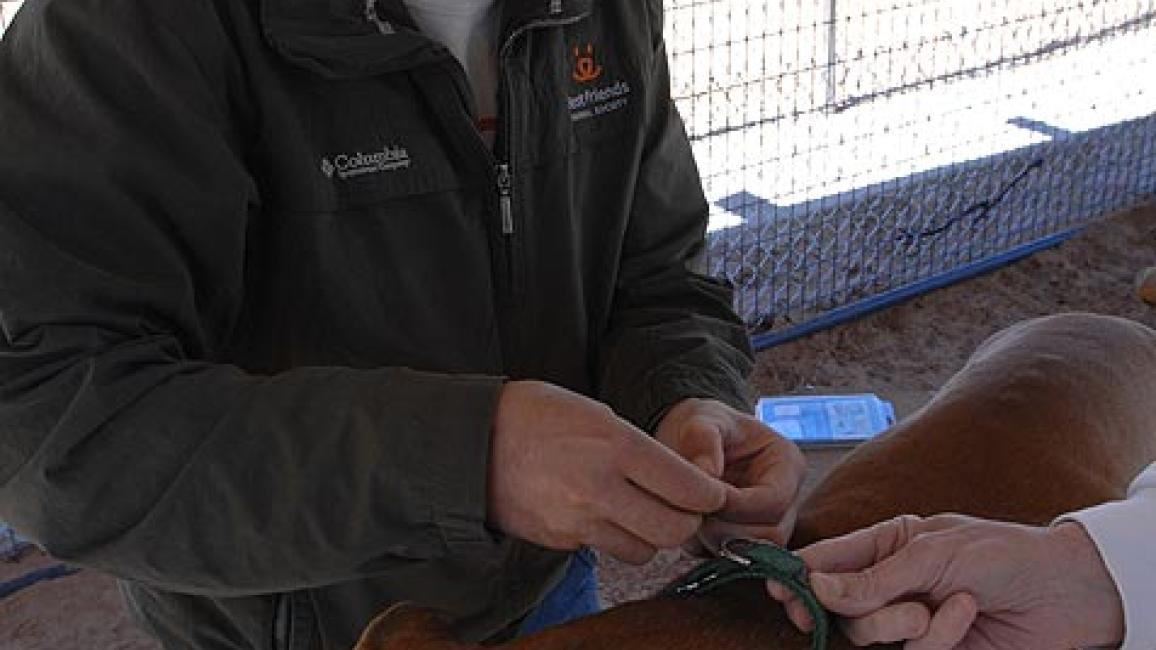Top Tag Pet IDs used to track Vicktory dogs' medical and behavioral info

The Vicktory dogs (dogs rescued from the a dog fighting ring on the property of NFL player Michael Vick) were given a new piece of jewelry recently, as Dogtown staff began using a computer "flash drive" on the dogs’ collars in an effort to more efficiently track their medical and behavioral progress, and hopefully make it easier to place them in forever homes.
Tracking Vicktory dogs' progress with Top Tag Pet IDs
The flash drives – supplied by Top Tag, a Best Friends corporate partner – are waterproof and able to hold extensive information, including PDF attachments of medical records and digitized radiographs. Called Top Tag Pet IDs, they received the Pinnacle award for best new pet product last year.
"They can store so much in-depth information – life-care plans and data on emotional, physical and medical issues," says Dogtown trainer John Garcia, who on March 5 attached the IDs to each dog’s collar. "They’ll contain key notes on the dogs’ progress – where they started, where they are now and how we got there."
Staff members simply pop a tag into the computer and enter whatever basic and advanced information they need. There are also extra Top Tags for staff who want to work after hours when the dogs are sleeping. They can input the data using the generic tags, then load it onto each individual dog’s tag at a later time.
Dog foster parents can update tags
John says the tags are better than paperwork because they stay with the dogs and can be updated by foster parents. Part of Best Friends’ agreement with the federal government calls for adoptable Vicktory dogs to be fostered six to eight months before they go to their forever home.
"If the foster parents add to the Top Tags," John says, "it will help us a lot more than a simple return sheet. The dogs will go home with six months of detailed information on their tags."
And if a dog needs some remedial training (the stress of change can sometimes affect a newly homed dog), the adopters can take the dog to a trainer, who can check the tag for data. John says, "The trainer can see what Best Friends was working on and what they did when the dog was exhibiting a particular behavior at the sanctuary."
Reporting to USDA on Vick dogs
The tags can also be useful in reporting back to the U.S. Department of Agriculture (USDA), which tracks the progress of all the Vick dogs – the 22 at our sanctuary and the 25 placed at several other sanctuaries around the country.
The Best Friends adoption department had been using the IDs for a few months when Top Tag suggested they could be useful with the Victory dogs. John and Dogtown manager Michelle Besmehn checked into it and last month gave it the green light.
"The biggest thing is that it will help us help the dogs," John says. "The more we can document, the more we can help."
Top Tag co-founder Peter Norback says his company is "very proud that Top Tag Pet ID is being used as a tool and a symbol to protect the welfare of the Vicktory dogs. When people see Top Tag on the collar of a Vicktory dog, they will know that this pit bull is very approachable, well-trained, well cared for and deeply loved.
"I think in the long run," he says, "when other pit bull guardians protect their pets with Top Tag, it could help this wonderful breed gain back its loving reputation."
Read more about the rescued Michael Vick dogs.
Photo by Gary Kalpakoff